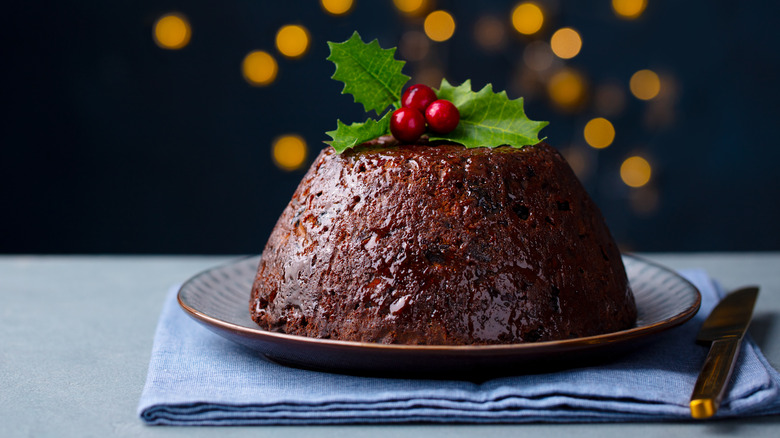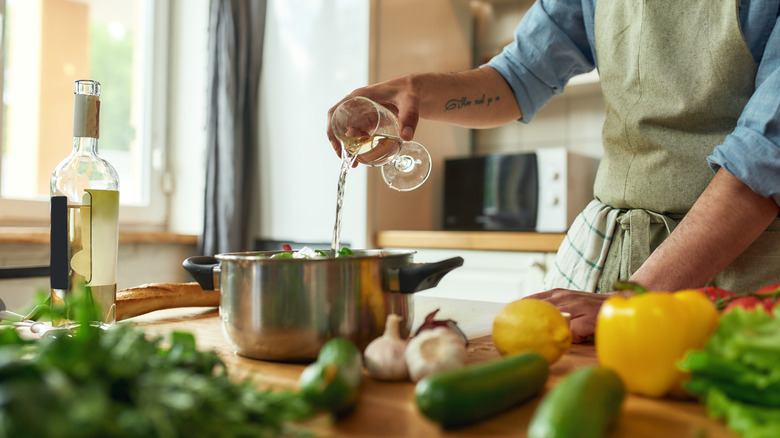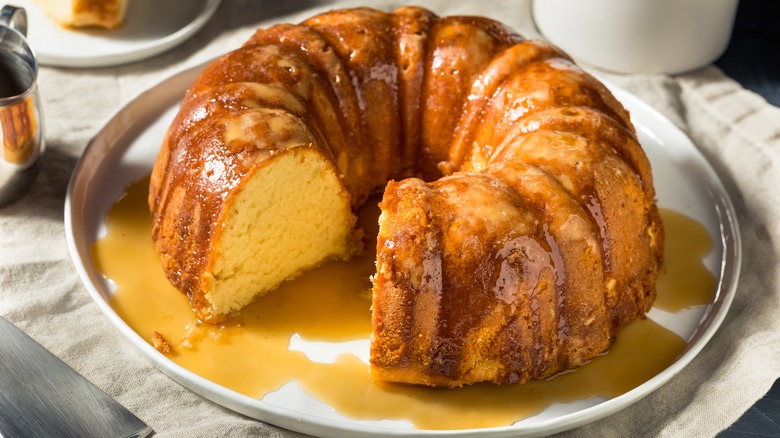The Rum Cake Alcohol Myth You Shouldn't Believe
A rum cake is an easy, festive addition to any holiday table. The rum-spiked sponge is baked in a Bundt pan, and drizzled and brushed with a rum syrup. The result is a cake that's so moist and rich that it doesn't need a glaze or frosting. It goes perfectly with a cup of coffee, or to top off a day of celebrations. However, if you're abstaining from alcohol, don't believe people when they tell you all the alcohol bakes off during the cooking process. Spoiler alert — it doesn't.
Typically, alcohol is merely a carrier for the flavor a particular recipe calls for, whether it's a scrumptious rum cake or a red wine sauce for your steak. Alcohol also enhances the flavors of other ingredients, like in a penne alla vodka where the vodka makes the tomato stand out and tenderizes meat. It's a versatile ingredient, and there are plenty of reasons to use it, but you should remember that while a significant amount of the alcohol does cook off, it's never 100% gone.
Alcohol cooks off at different rates depending on time and temperature
When cooking with booze, it's impossible to cook or bake all the alcohol out of a dish or dessert, but how much remains in the final presentation depends on a few things, namely temperature and length of time spent cooking, as well as the surface area of your cooking dish. Alcohol evaporates faster at higher temperatures, and more alcohol cooks off the longer something bakes. No matter what, though, alcohol molecules will stick to molecules of other things in the dish and stay put. It has been shown that even cooking dishes for hours still leaves a small percentage of alcohol remaining in the dish.
Additionally, it's important to consider the size of your cooking vessel when making rum cake. The larger the surface area, the more contact with oxygen the dish has, so the alcohol will evaporate more quickly in a larger pan or skillet. It's important to also keep in mind what ingredients you use and what you're making. A rum syrup drizzle to top your rum cake with, for example, will likely not have cooked nearly long enough (or at the appropriate temperature) to evaporate much alcohol. The cake itself, on the other hand, typically incorporates anywhere from a half to a full cup of rum, resulting in a baked cake with around 5% alcohol (the equivalent of a beer!).
You can substitute alcohol in recipes with ingredients with similar flavors
While other dishes might not turn out as boozy as rum cake, there might be any number of reasons to substitute the alcohol in anything you cook. Whether it's health-related, recovery, or religious, you don't need to feel left out of the world of boozy bakes. There are many ways to replace the alcohol in rum cake and other recipes that call for alcohol because what you want to focus on is the flavor — the alcohol is just the carrier. There are myriad ways to get similar flavors without alcohol using cooking and baking ingredient swaps such as using various vinegars, herbs, spices, and syrups.
A rum cake can be made with rum extracts and rum-flavored syrups, or a combination of ingredients like white grape juice, molasses, and almond extract. Conversely, you can also hunt down non-alcoholic rum. There are plenty of non-alcoholic spirits that can take the place of their boozy counterparts, so make your next rum cake a booze-free one, and don't fret about the alcohol content in your next bake.


